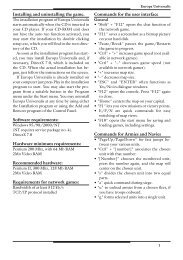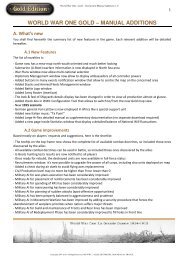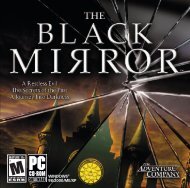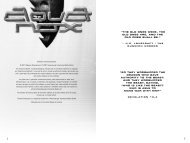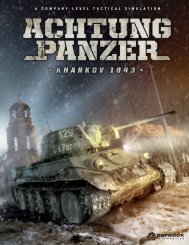You also want an ePaper? Increase the reach of your titles
YUMPU automatically turns print PDFs into web optimized ePapers that Google loves.
Naval Code Breaking<br />
Description: This event will allow you to make future naval encounters less<br />
or more likely to happen, on your choice. You will also benefit of a major<br />
bonus in naval surprise tests.<br />
Historical notes: Codes and ciphers were used extensively in World War<br />
One. Room 40, a room in the British Admiralty, was formed in October 1914<br />
to decrypt intercepts of German radio stations. Starting as a small unit of<br />
hobby cryptographs, it was expanded later in the war and played an<br />
important role in several naval engagements, including the detection of<br />
German sorties into the North Sea that lead to the battles of Dogger Bank<br />
and Jutland.<br />
Conditions: automatic.<br />
Difficulty: die roll 3+.<br />
Modifiers: +1 in 1914.<br />
Enter in play: Events phase, any turn.<br />
Option #1: (historical choice) Improve chances for future naval encounters<br />
– All future naval encounters will be more likely to happen: you will benefit<br />
from a +3 die-roll bonus to all naval interceptions attempts performed by<br />
your naval squadrons. In addition, a +2 die-roll bonus is also provided to all<br />
Naval Surprise tests!<br />
Option #2: Improve evasion tests for future naval encounters – All future<br />
naval encounters will be less likely to happen: you will benefit from a -3<br />
die-roll bonus to all naval evasion tests on enemy interceptions attempts<br />
performed against your naval squadrons. In addition, a +2 die-roll bonus is<br />
also provided to all Naval Surprise tests!<br />
Notes: once successfully in play, the event is discarded and can later be<br />
reshuffled in the deck.<br />
Sabotage<br />
Description: This event will make enemy reinforcements being delayed by<br />
one turn!<br />
Historical notes: The deprivations of the war were manifold and both<br />
soldiers at the front and people in the homeland considerably suffered from<br />
them. As the pitcher goes often to the well, but is broken at last, some<br />
people finally decided to put this suffering to an end.<br />
Conditions: automatic.<br />
Difficulty: die roll 5+.<br />
Enter in play: Events phase, any turn.<br />
Option #1: (historical choice) Enemy reinforcements delayed – All units<br />
enemy reinforcements are delayed by 1 turn!<br />
Notes: once successfully in play, the event is discarded and can later be<br />
reshuffled in the deck.<br />
Radio Codes<br />
Description: This event will allow you to protect your forces from the effects<br />
of enemy play of “Army Codes Breaking” or “Naval Codes Breaking”<br />
events. Also, you will get a bonus in Rolling Barrage firings!<br />
Historical notes: Codes and ciphers were used extensively in World War<br />
One. All major parties in the conflict undertook great efforts in code<br />
breaking and code development. Broken codes were replaced by new and<br />
better ones. However, it would not take too long until the new codes were<br />
broken and replaced themselves. An endless circle.<br />
Conditions: automatic.<br />
Difficulty: die roll 2+.<br />
Enter in play: Events phase, any turn.<br />
Option #1: (historical choice) Army Codes not broken – The effects of any<br />
Army Code Breaking event are to be unapplied!<br />
Option #2: Naval Codes not broken – The effects of any Naval Code<br />
Breaking event are to be unapplied!<br />
Option #2: Rolling Barrage bonus – The target nation will receive a +1<br />
bonus to all Rolling Barrage table die rolls during the following six turns!<br />
Notes: once successfully in play, the event is discarded and can later be<br />
reshuffled in the deck.<br />
Technological Stratagems<br />
Fokker<br />
Description: The engineer Fokker joins your side and contributes to the<br />
aviation development. This event will bring valuable bonuses in researches<br />
of aerial technologies.<br />
Historical notes: Born in the Dutch East Indies, Fokker was sent by his<br />
father to Germany to receive training as a mechanic. Yet his interest was in<br />
flying, prompting him to change schools. That same year Fokker built his<br />
first aircraft and in 1912 founded his first company, Fokker Aeroplanbau. In<br />
the following years he constructed a variety of airplanes and at the onset<br />
of War the German government took control of the factory. Fokker<br />
remained as director and designed many aircraft for the Luftstreitkräfte,<br />
World War One: La Grande Guerre 1914-1918 193



